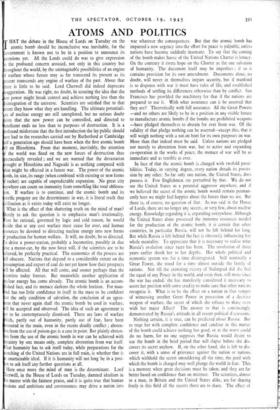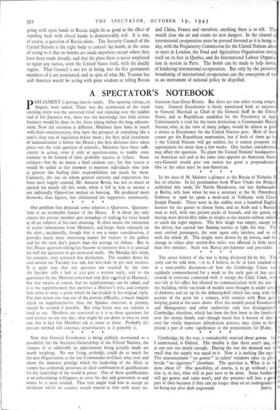ATOMS AND POLITICS
HAT the debate in the House of Lords on Tuesday on the atomic bomb should be inconclusive was inevitable, for the overnment is known not to be in a position to announce its • ntions yet. All the Lords could do was to give expression o the profound_ concern aroused, not only in this country but r ughoutthe world, by the unimaginable possibilities of an engine f warfare whose future may as far transcend its present as its 'resent transcends any engine of warfare of the past. About that ere is little to be said. Lord Cherwell did indeed deprecate xaggeration. He was right, no doubt, in scouting the idea that the ew power might break control and achieve nothing less than the isintegration of the universe. Scientists are satisfied that to that vent they know what they are handling. The ultimate potentiali- 'es of nuclear energy are still unexplored, but no serious doubt ists that the new power can be controlled, and directed to eficent ends no less than to purposes of destruction. It is a rofound misfortune that the first introduction the lay public should ave had to the researches carried out by Rutherford at Cambridge alf a generation ago should have been when the first atomic bomb 11 on Hiroshima. From that moment, inevitably, the attention f the world was fixed on the new forces of destruction thus ctacularly revealed ; and we are warned that the devastation r ught at Hiroshima and Nagasaki is as nothing compared with hat might be effected in a future war. The power of the atomic mb, its size, its range (when combined with existing or new forms frocket) are capable of unpredictable expansion. No great city ywhere can count on immunity from somethin' g like total oblitera- on. If warfare is to continue, and the atomic bomb and its orrific progeny are the determinants in war, it is literal truth that lisation as it exists today will exist no longer.
What is the effect of that shattering truth on the mind of man? erely to ask the question is to emphasise man's irrationality. fere he rational, governed by logic and cold reason, he would ecide that at any cost warfare must cease for ever, and human urces be devoted to directing nuclear energy into new forms production for human welfare. It will, no doubt, be so directed.
o drive a power-station, probably a locomotive, possibly in due me a motor-car, by the new force will, if the scientists are to be I eyed, be perfectly practical. The economics of the process are ill obscure. Nations that depend to a considerable extent on the snsumption and export of coal do not yet know how their prospects ill be affected. All that will come, and sooner perhaps than the i ntists today foresee. But meanwhile another application of u lear energy has come already. The atomic bomb is an accom- li hed fact, and its menace darkens the whole horizon. For man- :nd has too little confidence in itself in the mass to be confident at the only condition of salvation, the conclusion of an agree- 'cot that never again shall the atomic bomb be used in warfare, ill be accepted and observed. The idea of such an agreement is ot to be contemptuously dismissed. There are laws of warfare hich, partly out of humanity, partly out of fear, have been floured in the main, even in the recent deadly conflict ; absten- n from the use of poison-gas is a case in point. But plainly absten- on from the use of the atomic bomb in war can be achieved with tainty by one means only, complete abstention from war itself. at humanity has to ask itself today, while preparations for the unching of the United Nations are in full train, is whether that is unattainable ideal. If it is humanity will not long be in a posi- n to ask itself any further questions at all. Here once more the mind of man is the determinant. Lord' erwell, in the House of Lords on Tuesday, damned idealism in us matter with the faintest praise, and it is quite true that human sions and ambitions and covetousness may drive a nation into war whatever the consequences. But that the atomic bomb has imparted a new urgency into the effort for peace is palpable, unless nations have become suddenly insensate. To say that the coming of the bomb makes havcc of the United Nations Charter is lunacy. On the contrary it rivets hope on the Charter as the one salvation of humanity. The document itself may be imperfect ; if so it contains provision for its own amendment. Documents alone, no doubt, will never in themselves impart security, but if mankind is to dispense with war it must have rules of life, and established methods of settling its differences otherwise than by conflict. San Francisco has provided the machinery for that if the nations are prepared to use it. With what assurance can it be asserted that they are? Theoretically with full assurance. All the Great Powers —and no others are likely to be in a position in any visible future to manufacture atomic bombs if the bombs are prohibited weapons —have pledged themselws to abstain for ever from war. Of the validity of that pledge nothing can be asserted—except this, that it will weigh nothing with a nat:on bent for its own purposes on war. More than that indeed must be said. Unless nations are pledged not merely to abstention from war, but to active and expanding co-operation in the works of peace, the menace of war will be as immediate and as terrible as ever.
In face of that the atomic bomb is charged with twofold possi- bilities. Today, in varying degree, every nation dreads its posses- sion by any other. So far only one nation, the United States, does possess it. Few Englishmen are perturbed by that. We do not see the United States as a potential aggressor anywhere, and if we believed the secret of the atomic bomb would remain perman- ently hers we might feel happier about the future than we are. But there is, of course, no question of that. As was said in the House of Lords, there are no longer any secrets, or very few, about nuclear energy. Knowledge regarding it is expanding everywhere. Although the United States alone possessed the immense resources needed for the production of the atomic bomb, it is certain that other countries, in particular Russia, will not be left behind for long. But while Russia is left behind the fact is obviously influencing her whole mentality. To appreciate that it is necessary to realise what Russia's evolution since 1920 has been. The revolution of three years earlier shook her to her depths. Her whole political and economic system was for a time disintegrated. Still nominally a Great Power, she stood for a time almost outside the family of nations. Not till the crowning victory of Stalingrad did she feel the equal of any Power in the world, and even then, still more since the war has ended, she has manifestly considered it necessary to assert her position with some crudity to make sure that other natims recognise it. What is to be the effect on a nation in that temper of witnessing another Great Power in possession of a decisive weapon of warfare, the secret of which she refuses to share even with her major Allies? The answer to that is convincingly demonstrated by Russia's attitude in all recent political d;scussions.
Nothing certain, it is true, can be predicted about Russia. But to treat her with complete confidence and candour in this matter of the bomb could achieve nothing but good, or at the worst could do no harm, for no one supposes that Russia would desire to use the bomb in the brief period that will elapse before she dis- covers its secret anyhow. If, on the other hand, she is left to dis- cover it, with a sense of grievance against the nation or nations which withhold the secret smouldering all the time, the peril with which the bomb is charged may well plunge the world in fear. This is a moment when great decisions must be taken, and they are far better based on confidence than on mistrust. The scientists, almost to a man, in Britain and the United States alike, are for sharing freely in this field all the secrets there are to share. The effect of going with open hands to Russia might be as good as the effect of standing back with closed hands is demonstrably evil. It is not, of course, a question of Russia alone. The Security Council of the United Nations is the right body to control the bomb, in the sense of seeing to it that no bombs are made anywhere except where they have been made already, and that the plant there is never employed to equip any nation, even the United States itself, with the deadly engine. That Council is not yet in being, but the five permanent members of it are nominated, and in spite of what Mr. Truman has said America would be acting with great wisdom in telling Russia and China, France and ourselves, anything there is to tell. Tha would clear the air and create no new dangers. In the cleared ' international co-operation must be pressed forward as it is being to- day, with the Preparatory Commission for the United Nations abou to meet in London, the Food and Agriculture Organisation setting itself on its feet in Quebec, and the International Labour Organisa- tion in session in Paris. The bomb can be made to help instead of hindering international co-operation. But only by the persisten broadening of international co-operation can the conception of wa as an instrument of national policy be dispelled.



























 Previous page
Previous page